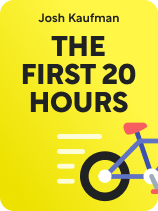

This article is an excerpt from the Shortform book guide to "The First 20 Hours" by Josh Kaufman. Shortform has the world's best summaries and analyses of books you should be reading.
Like this article? Sign up for a free trial here.
Do you need to pick up a new skill, like, yesterday? What’s the most efficient way to use your time and other resources?
While there’s no way to skip straight to the last stage of the skill acquisition process, you can speed up the process. You can do this by researching the skill enough to practice intelligently, breaking the skill down into its essential components, and then putting in 20 hours of focused practice time.
Read on to get practical advice from skill acquisition expert Josh Kaufman on how to learn a skill fast.
How to Learn a Skill Fast
Kaufman explains that the rate at which you learn a new skill depends on two factors: 1) How much time you devote to concentrated practice and 2) How intelligently you practice. To master the basics of a new skill in 20 hours, you need to optimize both of these factors. Kaufman’s process helps you do this. Let’s dive into his advice on how to learn a skill fast.
(Shortform note: The two factors affecting how quickly you learn a skill are both things you can control. However, other experts point out there are also factors outside of your control that affect your skill acquisition speed—for example, your personality, genetics, confidence, past experiences, and preexisting skills.)
Step 1: Choose Your Skill
First, decide what skill you want to learn. Kaufman suggests you choose the skill you’re most excited about. The more interest you have in a skill, the more motivated and focused you’ll be and the faster you’ll improve.
Kaufman advises against trying to learn multiple new skills at the same time. Acquiring skills requires focus and concentration, and switching between different skills distracts you and slows down your progress. Concentrating your time and energy on one skill allows you to improve as fast as possible.
Once you’ve chosen the skill you want to acquire, set a goal for how proficient you want to become. To do this, Kaufman suggests you ask yourself why you want to learn the skill in the first place. Be specific and describe what you hope to accomplish with the skill so you can focus on practicing the aspects of it that are most relevant to your goal.
Kaufman suggests you avoid aiming too high when deciding your goal. Ideally, the goal should be just out of reach. Hitting your goal doesn’t have to signal the end of your skill-building.
Step 2: Research and Prepare
Next, Kaufman suggests you conduct research to learn about the skill and prepare what you need to practice it. Acquiring knowledge and information about the skill beforehand allows you to practice smarter and avoid wasting time and energy on ineffective techniques.
(Shortform note: When he initially outlines his step-by-step process, Kaufman suggests doing research as Step 3, after you break down the skill into essential subskills. However, this may not be easy, or even possible, depending on your prior knowledge or the complexity of the skill—you’ll likely need to do some research first to identify which subskills you’ll need. In fact, in the examples he details in the book, where he describes his own process of acquiring six new skills, he often did the research step first, before identifying subskills. For this reason, we’re discussing the research step before the deconstruction step.)
Research just enough that you’ll be able to recognize and fix mistakes when practicing. Kaufman stresses that research and learning aren’t the same as practicing. So, don’t spend too long on this step, as you’ll acquire a skill more quickly by practicing it than studying it endlessly.
Kaufman provides some suggestions for researching your skill.
Find Reference Materials
First, gather at least three resources that discuss the skill and quickly scan through them to find out what you need to know to practice. Look for approaches, techniques, and materials that the different resources agree on.
Look for Mental Models
To make the most of the information you find during your research, Kaufman recommends you look for mental models. These are concepts you learn that help you understand how something works. To remember the mental models you come across, use metaphors or analogies to connect them with things you already know and understand. Drawing on these connections helps you to apply new knowledge more easily when you’re putting the skill to practice.
Consult Experts
Experts can clear up misconceptions you have about learning the skill and help you set realistic expectations for yourself. They may also have tips that can help you avoid wasting resources on unnecessary supplies or ineffective techniques.
Gather Necessary Materials
Gather the right tools and equipment to practice the skill. Based on your research, identify everything you’ll need and make sure you can acquire it. This way, you won’t disrupt your practice by suddenly discovering that you’re missing a vital component.
Step 3: Identify Essential Subskills
Separate the skill into subskills and focus on learning the most essential ones. Kaufman explains that most skills are composed of a set of smaller skills. These subskills should include everything you need to attain your proficiency goal.
Kaufman suggests you think of the worst-case scenario that can occur when you’re practicing the skill. Think about what’s risky or what outcomes you want to avoid.
Step 4: Overcome Learning Obstacles
Before you start practicing a new skill, Kaufman recommends that you first think ahead and prepare for potential obstacles that may affect the quality of your practice.
Let’s look at a few common obstacles and how to avoid them.
Obstacle 1: Psychological Barriers
Learning a new skill is uncomfortable because it requires you to struggle and feel inadequate at first. You start off with many doubts and frustrations when all you want is for the skill to feel easy and fun. To overcome this barrier, focus on competence, not mastery. If you immediately want to be outstanding at something, you’ll get frustrated and discouraged.
Obstacle 2: Too Much Effort to Start Practicing
Kaufman writes that your willpower is limited. The more effort it takes to start practicing, the more likely you are to procrastinate or avoid doing it altogether. Because of this, he recommends you make it as easy and convenient as possible to start practicing your skill.
Obstacle 3: Distractions
External distractions, like noisy roommates or phone notifications, can also get in the way of you practicing your skill. To avoid these, Kaufman suggests you preemptively clear your surroundings of distractions in preparation for your practice.
Step 5: Practice Your Skill
To get good at any skill, you must practice it in a real-life context, not merely read about it or watch others do it. Because it’s easy to get frustrated and give up on a skill at the beginning, Kaufman recommends you commit to doing at least 20 hours of deliberate practice.
Deliberate practice is when you actively work on improving your skill instead of just passively doing things related to the skill, and Kaufman argues that it’s crucial for improvement.
Kaufman provides some tips for practicing your skill more effectively.
Tip #1: Break up your practice. Kaufman suggests you spend at least 90 minutes a day practicing your skill. But, because practicing for a long time can be frustrating and difficult, he recommends you split your practice time into 20-minute chunks throughout the day.
Tip #2: Focus on quantity over quality. It’s more important to practice a skill regularly than to practice it perfectly. Focus on doing it “well enough” and as often as you can within a short time. This helps you learn quickly, as you get more chances to perform the skill and learn from your mistakes.
Tip #3: Use practice methods that give you immediate feedback. Immediate feedback makes it easier for you to recognize with more accuracy what went wrong and to adjust your strategy. Use online tests, find coaches and mentors, or videotape yourself practicing.
Tip #4: Practice motor skills before sleep. Kaufman cites research showing that sleeping within four hours of practicing a motor skill helps your brain process and store the movements you learned.
Tip #5: Space out your studies. If the skill you’re learning requires memorizing information, Kaufman suggests you review the information at different time intervals—a technique called “spaced repetition.”
Tip #6: Create checklists and processes. Kaufman suggests you make the routine elements of your skill more effortless by creating checklists. He also recommends creating processes for your practice so that your performance is consistent.
Tip #6: Experiment. During your practice, try out various strategies and techniques that you’ve gathered during your research and brainstorm new ideas. Experimenting with techniques accelerates your learning by helping you find better ways to practice.
Exercise: Prepare for Your 20 Hours of Practice
To learn a skill with only 20 hours of practice, you must do some preliminary work before you start practicing. Research a skill you’re interested in and plan how to optimize your practice time.
- Describe the skill you’re most interested in learning. What’s your goal? What do you hope to achieve with the skill? For example, you might want to learn how to draw so you can make art assets for a game you’re developing.
- Spend a few minutes researching your skill. What are the basic subskills you need to learn in order to achieve your goal?
- What are some obstacles you might encounter while practicing this skill? What can you do to avoid them?
- Which of Kaufman’s practice tips can you use when practicing your skill? How might you implement them?

———End of Preview———
Like what you just read? Read the rest of the world's best book summary and analysis of Josh Kaufman's "The First 20 Hours" at Shortform.
Here's what you'll find in our full The First 20 Hours summary:
- A simple and effective method for learning almost any skill in 20 hours
- The misconceptions that hold us back from learning new skills
- Actionable tips to help you optimize your skill-building experience






